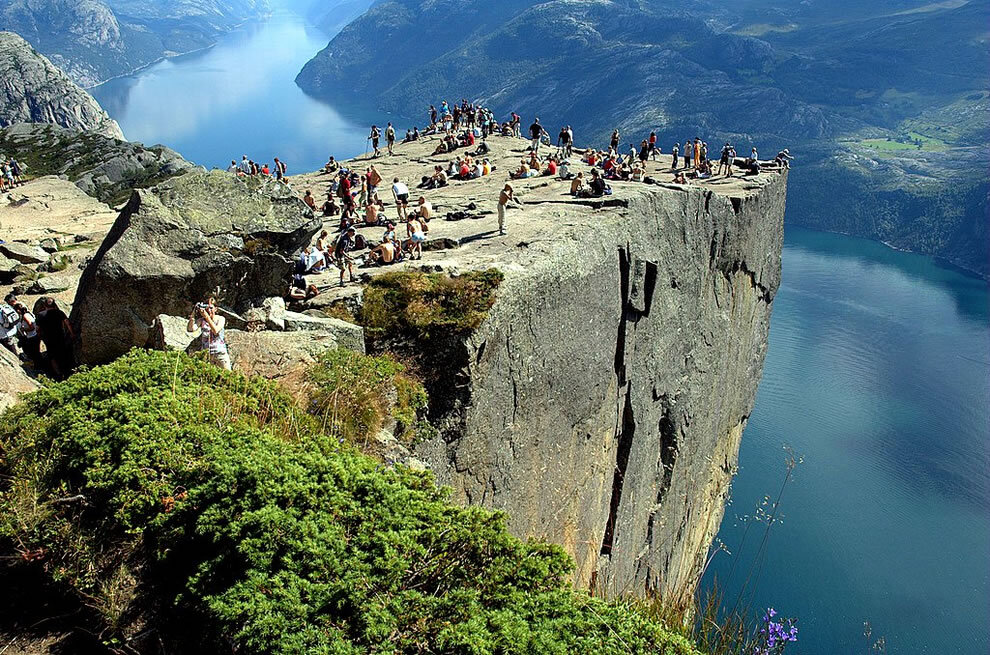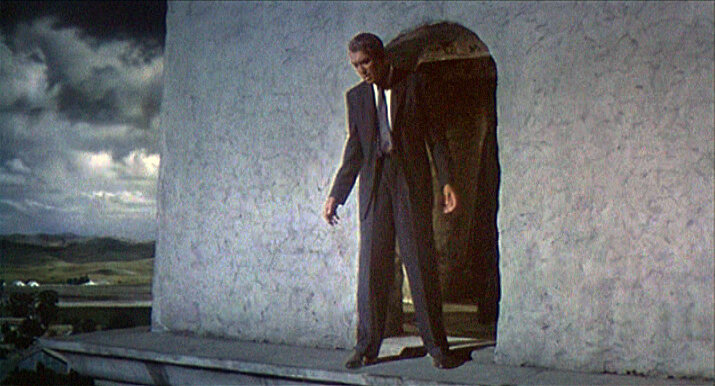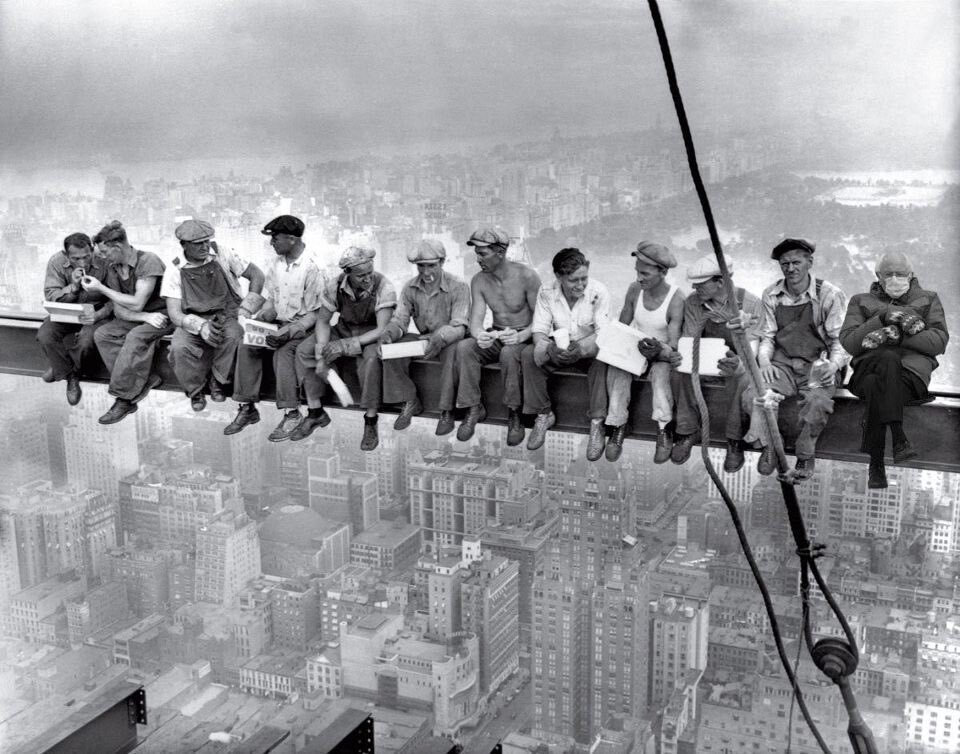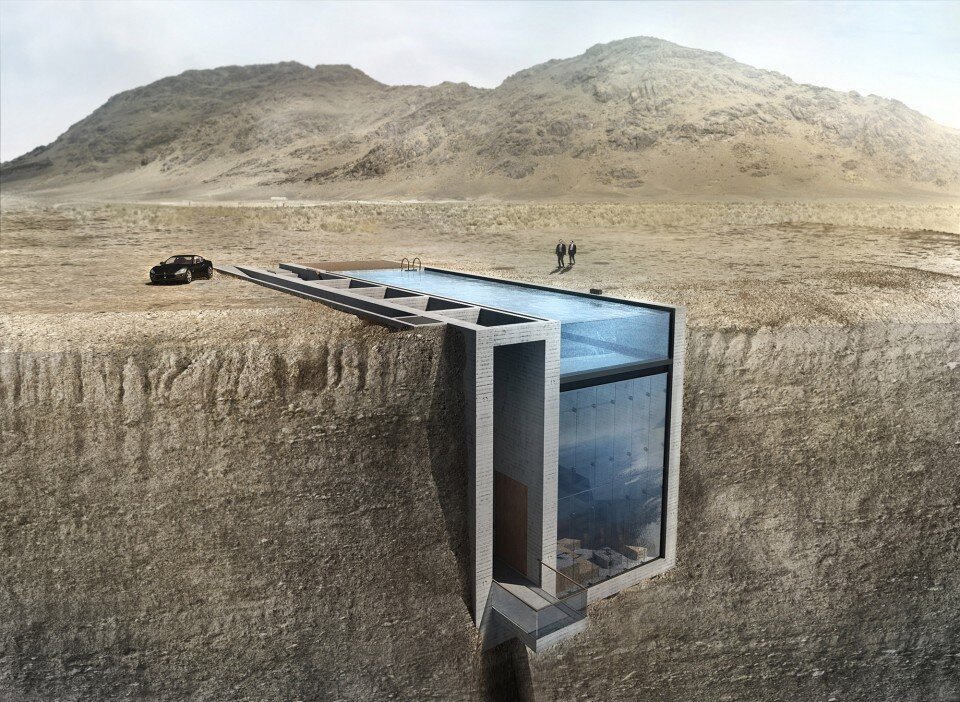By The Landlord
"Life is a picnic on a precipice.” – W. H. Auden
"We stand in life at midnight; we are always at the threshold of a new dawn." – Dr Martin Luther King
"And perhaps in this is the whole difference; perhaps all the wisdom, and all truth, and all sincerity, are just compressed into that inappreciable moment of time in which we step over the threshold of the invisible.” – Joseph Conrad
“Life is a travelling to the edge of knowledge, then a leap taken.” – D. H. Lawrence
“Beyond the edge of the world there’s a space where emptiness and substance neatly overlap, where past and future form a continuous, endless loop. And, hovering about, there are signs no one has ever read, chords no one has ever heard.” – Haruki Murakami
Are we living on the edge, heading for the abyss, or teetering back from the brink? With all manner of recent events, whether daily, or over a period of years, happening slowly or fast, there's no simple answer to that. Perhaps, with a recent changeover of power in the US, the world is stepping back from a vertiginous, self-destructive, lemming-rush, swivel-eyed, truth-distorting madness just a little, but from Covid to climate change, poverty to inequality and prejudice and of course the cliff-jump of Brexit, there are many dangerous precipices ahead. And here are a few more of today’s many customers with something to say on that score:
"For many men that stumble at the threshold are well foretold that danger lurks within." – William Shakespeare
"The blizzard of the world has crossed the threshold and it's overturned the order of the soul." – Leonard Cohen
“We are on the precipice of climate system tipping points beyond which there is no redemption.” – James Hansen
“We live in a pretty bleak time. I feel that in the air. Everything is uncertain. Everything feels like its on the precipice of some major transformation, whether we like it or not.” – Sean Lennon
“It’s only on the brink that people find the will to change. Only at the precipice do we evolve.” – John Cleese
"The tipping point is that magic moment when an idea, trend, or social behavior crosses a threshold, tips, and spreads like wildfire." – Malcolm Gladwell
Yet somehow we need those dangers. When thinking about edges, ledges and thresholds, there are many angles to consider, and this week's topic is both literal and metaphorical, from the everyday to the extreme and terrifying, but also life-affirming. It could be about the edges of a physical place – from a mountain cliff to a window ledge to a riverbank, a knife or razor’s edge, or a state of mind, being on the edge of sanity, one’s abilities, wits, strength, patience, or losing your edge, but also perhaps entering a new level or a moment of change. Living on the edge is what some people need to literally feel alive, and it's certainly a lifestyle that has marked that of many great musicians. The edge is where creativity lives, dies and thrives.
In the past we’ve tackled the topic of songs about barriers, borders, walls and fences, one that has been revisited by readers many times, but this offers many different locations and perspectives.
There are hundreds of songs that include the words of this topic in titles or lyrics, from all contexts, as well as living on that verge, so instead of picking out a few to get things started, this week I’m seeking out other viewpoints and contexts to help find inspiration.
There's something in human nature that always seeks out the edge, even for a fleeting few moments, either to have a safe little picnic or peer or even dangle over edge, or clamber up all the way from the other side.
Preikestolen, also known as Pulpit Rock, is a breathtaking view at the end of a 90-minute walk up to a huge cliff in Rogaland county, Norway, reached from Stavanger. It's a big tourist attraction, but I'm pleased to say I've been there too. It is fantastic, and when I walked near the edge, it triggered some flight-and-fight mechanism in the brain, making my ankles and other parts tingle. But inevitably, while most people just enjoy the view and then depart, there is also always a queue of people wanting to have their picture taken right at the very edge, and there have even been cases of idiots who have tragically fallen off in attempting the ultimate selfie.
Trolltunga
Yet adrenalin rush is a reminder of how it feels to be alive. It must be even stronger when you walk to the edge of the more remote and even more dramatic Trolltunga, roughly 1,100 metres above sea level in Ullensvang, Vestland.
Journeying to edge is very much the human story, seeking out a new place of physical and mental existence. Going for a picnic on a rock isn’t always just a pleasant day out. Peter Weir’s astonishing 1975 film Picnic At Hanging Rock, from the book by Joan Lindsay, is about a group of schoolgirls in 1900 who go missing on a summer’s day trip on that strange geological formation known as Hanging Rock, Mount Diogenes, Dryden's Rock, or or originally, Ngannelong. It’s a surreal, shimmeringly strange, mind-altering story of female adolescence and transitioning, with a beautiful soundtrack. It reminds me of a quote by M.H. Boroson, in The Girl with Ghost Eyes:
“Nothing is ever as simple as it seems. At the edge of perception, weird things dance and howl.”
Edges and precipices have long been explored in film. In the earlier days of those madcap all-encompassing creative stuntmen Buster Keaton and Harold Lloyd, there wasn’t time for special effects, metaphor or health and safety, they both just made the leap and clung on, including for Harold Lloyd’s Safety Last:
Harold Lloyd in Safety Last
Buster Keaton is surely the true king of living on the physical edge in film. He had planned to make this jump in Three Ages (1923), but missed and injured himself. He decided to keep the resulting footage and build a new sequence around it.
Buster Keaton: always on the edge
Alfred Hitchcock’s Vertigo, also with a fabulous soundtrack of course, explores the physical and psychological edge in many ways. There’s a famous dream sequence, edges of madness and obsession in a relationship, his deep-seated fear of heights from an earlier accident when a colleague dies, and a relentless pursuit to find the truth despite his cremnophobia:
James Stewart on the edge of madness in Hitchcock’s Vertigo (1958)
Carl Jung, appropriately has popped into the Bar, and in the context of this film, defines the psychological threshold in terms of the mind and sleep. “In sleep, fantasy takes the form of dreams. But in waking life, too, we continue to dream beneath the threshold of consciousness, especially when under the influence of repressed or other unconscious complexes."
In a different style, but no less profound note, The Truman Show in 1998, again directed by Peter Weir, has a brilliant plot in which Jim Carrey plays the unwitting star of a reality TV show from birth, living in a world he believes is real, but is a huge studio set and all his family and the town he inhabits are actors. When he finally discovers that his world his entirely artificial, he escapes off the island of this place in a sailing boat, only to discover that the horizon and the sky, another edge and threshold of course, is all a vast painted wall, at which point his mind teeters on his own edge of sanity.
It’s a clever throwback to the idea of the flat earth, when early explorers feared that by sailing across the oceans they would fall off the edge of the world. As Bob Black puts it: “The reinvention of daily life means marching off the edge of our maps.” On that score, it’s no coincidence that during the madness of the past few years, the Flat Earth Society has somehow gained many new members, symptomatic of online media-driving conspiracy theory fever, and capped by this, most unintentionally ironic and Trump like of many tweets.
There are many other films that have explored the idea of the edge in profound ways, from the brilliant BBC TV series, Edge of Darkness, set at the height of the Cold War and the nuclear threat, to the more recent Edge of Democracy, which sums up so much of what has gone wrong in the world in the context of Brazil:
When there’s a particularly stimulating topic at the Bar, there are always a number of distinguished guests queuing up to have their say, and there’s a particularly interesting bunch waiting to be served, and serve up their thoughts this week. So to begin with, what if there were no edges, or ledges or thresholds at all. How might that frame our own existence? The great Stephen Hawking posits that idea with one of the biggest questions.
“So long as the universe had a beginning, we could suppose it had a creator. But if the universe is really completely self-contained, having no boundary or edge, it would have neither beginning nor end: it would simply be. What place, then, for a creator?”
The contemporary Indonesian popular writer about economics and more, Toba Beta, author of Master of Stupidity, and My Ancestor Was an Ancient Astronaut, takes on a counter argument about the existence of an universal edge:
“Nothing can be inside an edgeless universe .... Just because yet unable to comprehend the real form of the edge, doesn't mean that this universe is infinite.”
Bertrand Russell jumps in between the two, and also tackles that question with a mix of optimism, pessimism and causation. “It is possible that mankind is on the threshold of a golden age; but, if so, it will be necessary first to slay the dragon that guards the door, and this dragon is religion."
We need edges, but they are never easy to see. “Truth uncompromisingly told will always have its ragged edges, writes Herman Melville.
"The world, nature, human beings, do not move like machines. The edges are never clear-cut, but always frayed. Nature never draws a line without smudging it,” adds Winston Churchill.
So it is that ambiguity about what, if, or where edges are to be found, that stimulates our instincts, our creativity, and of course, for this place, song. The great Johann Wolfgang von Goethe is also in our pub, and he is taking the opportunity for a decent pint and a think: “All beginnings are delightful; the threshold is the place to pause.”
Workers on the edge take lunch, with a topical guest on the end wearing mittens
Who else is coming in. Here’s Van Morrison, knocking, waiting for a drink and eager for those music venues to reopen, especially so he can tour again in Europe. “I'm a dweller of the threshold and I'm waiting at the door, and I'm standing in the darkness, I don't want to wait no more."
The excellent actor Brad Dourif, who originally played the young Billy Bibbit in the film One Flew Over the Cuckoo's Nest, puts his metaphor in a bigger liquid form: “We all have an edge. We all are floating our psyche on top with a great ocean underneath.”
Hunter S Thompson is a veteran of living life on the edge. In his book Hell’s Angels, he sees a parallel with riding a fast motorbike and other kinds of living precariously, via drugs and other dangers and within a musical context too.
“So the lever goes up into fourth, and now there's no sound except wind. Screw it all the way over, reach through the handlebars to raise the headlight beam, the needle leans down on a hundred, and wind-burned eyeballs strain to see down the centerline, trying to provide a margin for the reflexes.
But with the throttle screwed on there is only the barest margin, and no room at all for mistakes. It has to be done right ... and that's when the strange music starts, when you stretch your luck so far that fear becomes exhilaration and vibrates along your arms. You can barely see at a hundred; the tears blow back so fast that they vaporize before they get to your ears. The only sounds are wind and a dull roar floating back from the mufflers. You watch the white line and try to lean with it ... howling through a turn to the right, then to the left and down the long hill to Pacifica ... letting off now, watching for cops, but only until the next dark stretch and another few seconds on the edge ...
The Edge ... There is no honest way to explain it because the only people who really know where it is are the ones who have gone over. The others -- the living -- are those who pushed their control as far as they felt they could handle it, and then pulled back, or slowed down, or did whatever they had to when it came time to choose between Now and Later.
But the edge is still Out there. Or maybe it's In. The association of motorcycles with LSD is no accident of publicity. They are both a means to an end, to the place of definitions.”
Hunter S Thompson: exploring the edges of sanity, and perception with drugs, guns and motorcycles
And there are many other writers keen to show their edge on this subject:
“I want to stand as close to the edge as I can without going over. Out on the edge you see all the kinds of things you can't see from the center.” – Kurt Vonnegut
“From a good book, I want to be taken to the very edge. I want a glimpse into that outer darkness.” – Mark Haddon
Going to the edge might be dangerous, but it can also be where the innovation lies.
“There is never a crowd on the leading edge,” says Esther Hicks.
“'Tis the sharpness of our mind that gives the edge to our pains and pleasures,” adds Michel de Montaigne.
Being on the cutting edge is where some must inhabit. And some take this literally, such as with the architectural concept that is now apparently being built, the high-cliff Casa Brutale, with swimming pool at the top so you can swim and live to the cliff edge:
The Casa Brutale project
“You'd think a guy who has broken 35 bones in his body would have a high pain threshold, but mine is pretty low. I got hit in the shin with a golf ball once, and it almost brought tears to my eyes. I've had broken bones that didn't hurt as bad,” says the devil-daring Evel Knievel, with stuntman equivalent of Hunter S Thompson.
“Those who have learned to walk on the threshold of the unknown worlds, by means of what are commonly termed par excellence the exact sciences, may then, with the fair white wings of imagination, hope to soar further into the unexplored amidst which we live,” says the great and extraordinarily intelligent Ada Lovelace, and arguably inventor behind the scenes of the Babbage Difference Engine, working towards the modern computer.
"When the whole world is running headlong towards the precipice, one who walks in the opposite direction is looked at as being crazy,” declares T. S. Eliot.
“Ay, on the shores of darkness there is a light, and precipices show untrodden green; there is a budding morrow in midnight; there is triple sight in blindness keen,” opines John Keats.
"Poetry is like walking along a little, tiny, narrow ridge up on a precipice. You never know the next step, whether there's going to be a plunge,” adds Josephine Jacobsen.
"Being on the edge isn't as safe, but the view is better,” pipes up Ricky Gervais, who is right of course, but is always keen have it both ways, to get in with the in-crowd, but also seen to be innovative.
Only in this bar could Ricky Gervais be rubbing shoulders with Ingmar Bergman. The latter says: "Old age is like climbing a mountain. You climb from ledge to ledge. The higher you get, the more tired and breathless you become, but your views become more extensive."
Culturally and creatively, others admit that being cutting-edge isn’t always possible. “Some people go to Berlin to get more cutting edge; I went and started wearing lederhosen and going to visit baroque palaces,” adds a jovial Rufus Wainwright.
“Well, yes, the 60s had edge; the 70s had embroidery,” says glib Gina Barreca.
Taking an even less serious tone, here’s Steven Wright: "The other day, I was walking my dog around my building . . . on the ledge. Some people are afraid of heights. Not me, I'm afraid of widths."
But of course the ledge can also be a place where life tragically, and suddenly ends.
It’s time for this introduction to end, but first, here’s a last quote from another guest in the Bar, Wu-Tang Clan’s de facto leader, RZA, who defines the ledge in this way:
“The word "knowledge" itself, we like to break it down into two different words, "know" and "ledge." You've got to know the ledge. Know the limitation of things. Know where they go, know where they start from. We say knowledge is the basic foundation of the universe. But everything is first based on something being known. Then, when it's known, then it can be manifested.”
So do end, here’s an opening track for this topic, and no doubt one of RZA’s own inspirations, the great rapper New York Rakim with Eric B, with a track used for the film Juice, which follows the adventures, and often mis-steps of four young guys living on the edge:
So then, with that, I hand you over to this week’s guest guru, who will no doubt keep everyone on the straight and narrow, but also invite a certain edginess to your nominations, the marvellous Maki! Please place your songs in comments below for last orders on Monday at 11pm UK time for playlists published next week. The view will no doubt be stunning.
New to comment? It is quick and easy. You just need to login to Disqus once. All is explained in About/FAQs ...
Fancy a turn behind the pumps at The Song Bar? Care to choose a playlist from songs nominated and write something about it? Then feel free to contact The Song Bar here, or try the usual email address. Also please follow us social media:: Song Bar Twitter, Song Bar Facebook. Song Bar YouTube, and Song Bar Instagram. Please subscribe, follow and share.
Song Bar is non-profit and is simply about sharing great music. We don’t do clickbait or advertisements. Please make any donation to help keep the Bar running:









